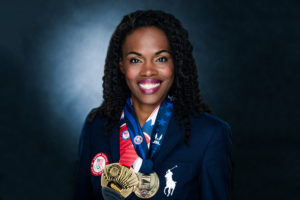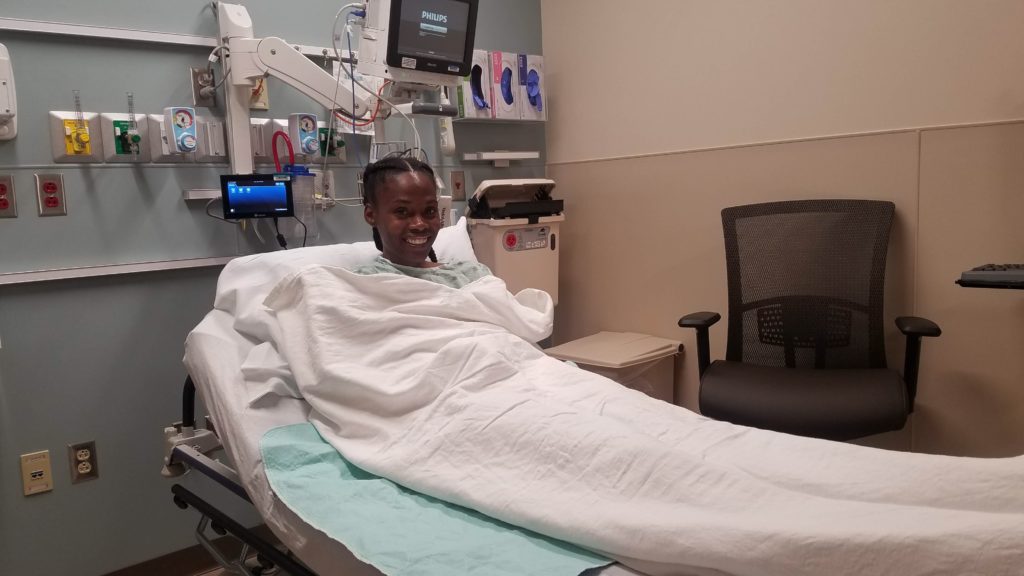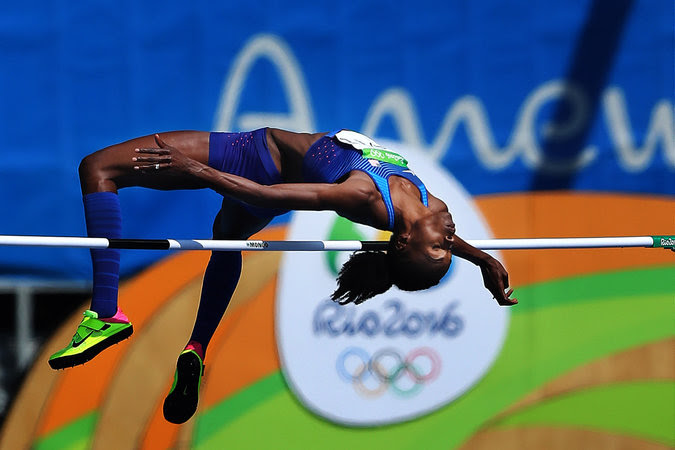About Chaunte

Chaunté Lowe is an American high jumper and a four-time Olympian. She holds the American record in the women’s high jump in both outdoor and indoor categories. She is a mom of three, and an advocate for knowing your body. Follow Chaunte on Instagram here.
Transcript
Adam: (00:00) My guest on the show today is Chaunte Louw. Chaunte, welcome to the show.
Chaunte: (00:04) Thank you so much for having me. I’m really happy to be here.
Adam: (00:07) I’m really excited to hear your story. I’m excited to hear your past, your present, what you’re working on now and where you’re headed. So, let’s start there, tell me about your story.
Chaunte: (00:17) Okay, so my story is I am a four-time United States Olympian. I absolutely love jumping so I’ve been doing that almost my whole life and just recently as of June this last year, I actually found out that I had breast cancer. So, I went through chemotherapy, a double mastectomy and the reconstruction and all of that so it’s definitely been a whirlwind experience in the last not even six months, yeah.
Adam: (00:48) Wow, that’s a really short amount of time to go through a lot of stuff.
Chaunte: (00:52) Yeah.
Adam: (00:52) And so if I’m remembering correctly, part of your story is that you found a lump, you went to your doctor. You were sent away and you went back, so tell me a little bit about that.

Chaunte: (01:05) Yes, yeah so I’m very in tune with my body being an athlete. I mean, I know if my hair’s growing faster than it normally does. If my muscles are bigger or smaller like I know everything about my body and I had a friend who actually found her lump at stage zero cancer and she was an Olympian. So at that point, I asked her how to do a self-breast exam. She told me how to do it and so I was just doing them regularly and I must have known the month that the lump showed up, and when you feel something obviously your blood turns to a chill and you’re just like, “Oh my gosh, what is this?” And so, at that time I was thirty-four years old. I go to the doctor and I kind of knew they weren’t going to give me an ultrasound or a mammogram because of my age.
(01:51) And so there was one part where I fibbed on the questionnaire. They asked if anybody in my family had breast cancer and I said, yes, my mom and my sister, which I don’t wish that on them, but that’s the only reason why they actually gave me a diagnostic mammogram and ultrasound that day. And so then I go in, I get the mammogram, they don’t see anything, and then they’re like, “Okay, let’s do the ultrasound,” and then they see it and the doctor comes in. Then he’s saying, “Nope, it’s just a lymph node. I don’t want to see you again for another six years.” I was like, “Okay, a lymph node great I could handle that.” So I went to the natural food store, I got a lymph node detox. I started going to the sauna to try to sweat out anything.
(02:31) I had a cavity so I was like, okay, maybe it’s that so I got that taken care of and it didn’t go away. And it’s like eleven months later and I was like okay, I’ve done for the last eleven months I’ve done everything holistically that I know to do and it didn’t go away. So, I go back to the doctor and I was like, “Look, you said it was a lymph node.” No, I went to a different doctor, I’m sorry, and it was a primary care physician and I told her everything that went on. She was like, “I would feel absolutely horrible if I didn’t take a second look.” And so she went in and she sent me in for a diagnostic ultrasound and mammogram again. The same doctor was like, “Oh, it looks a lot different now,” and that was the point where they found out within days, I found out it was triple-negative breast cancer.
Adam: (03:19) Wow, oh man it’s a good thing you didn’t wait six years.
Chaunte: (03:24) You’d still be telling.
Adam: (03:24) Wow, so alright then you get diagnosed and you are, correct me if I’m wrong, you’re going through chemo while training for your fifth Olympic games, is that right?
Chaunte: (03:36) Yes, so I’m completed with chemo now, but the entire time that I was going through chemo, I trained.
Adam: (03:42) Please, please tell me about that experience. That is remarkable.
Chaunte: (03:46) It was really, at first I thought it was going to be very easy. You know if you’ve done chemo, you know that there rounds, they kind of build upon another, so after the first round I was, “Okay, I could handle this, this is good.” The second round I was like, “Oh my gosh, oh, who punched me in the face and back and legs?” It got harder, but I think because so many people were rallying behind me and so many people knew my story, I felt like it was my responsibility to keep going so I kept pushing all the way through. There were times where I did my practice with a walker, but I was out there practising.
Adam: (04:20) Wow, and so as an elite athlete you’re extremely in tune with your body like we talked about earlier. You know when your hair is growing faster, right, and I would imagine it’s even more important for you to listen to your body now. So, what lessons have you learned through this journey and what has your doctor’s reaction been to your plan?
Chaunte: (04:43) Okay, so I think that the biggest thing is, you know when something’s wrong. You know when something’s not quite right and you have to push and push and push and if that doctor won’t listen to you, go to a different doctor who will. Second opinion, third opinion, fourth opinion until you are satisfied. I think that there’s a lot of message boards or social media outlets where women share ideas on how to get those diagnostic results. I think the greatest bit of advice I ever got was if they refuse to give you a test, tell them you want them to note that in your file that they refused to give you that test, and in doing that usually they’ll give it to you.
Adam: (05:23) Yeah, it makes them nervous, right.
Chaunte: (05:26) Yeah.
Adam: (05:26) Smart, that’s smart. It’s tricky, I like that and so talk about how have your friends and your family helped you through this? What kind of support have you received in this process?
Chaunte: (05:37) They’ve been amazing. I think at first it was hard for them because I felt like I was like the super woman or the wonder woman of our family and I think it was good for it to happen to me because it shook everybody to their core. Like, “Oh my gosh, she’s so healthy. She works out eight hours a day and she eats right?” And it’s like there’s certain things that I didn’t pay attention to. I never ate organic. I was like, “Ah organic’s expensive,” and now all I eat is organic. I might eat right six days a week, but on that seventh day I will eat sugar from sunup to sundown and like those are things that I pay attention to now and I’m very outspoken about them to the people that I love. So yeah, they’ve been a great support and now I’m being a support for them as well.
Adam: (06:25) I imagine that would really shake your foundation when the most healthy person that you know in your whole world is diagnosed with breast cancer that’s just a major thing.
Chaunte: (06:35) Yeah, and it’s one of those things that it doesn’t really discriminate.
Adam: (06:39) Yeah, that’s right.
Chaunte: (06:40) This particular cancer it wasn’t attached to genetics. It had nothing to do with that at all so we don’t really know what caused it, but I know that I wasn’t paying attention to the fact that one in eight women in America will be diagnosed with breast cancer in their lifetime. I had heard it, but I didn’t pay attention to it so now I’m paying attention.
Adam: (07:02) Yeah, that’s great. That’s great and talk to me a little bit about how Susan G Komen has played a role in your breast cancer journey.
Chaunte: (07:08) So I was getting to the point where I was frustrated because I thought that there would be an abundance of resources about community and how to deal with depression and what to expect and being connected with other women that are going through the same thing. You kind of really want that and I couldn’t find it. And so I went on social media and I had actually Googled Olympians who had cancer and I found Teagan Randall.
Adam: (07:37) Oh yeah I’ve had her on the show. She’s fantastic, yeah.
Chaunte: (07:38) Yeah, she’s amazing.
Adam: (07:44) Yeah, she is.
Chaunte: (07:44) And so we have almost the same story, four-time Olympian, mother, I don’t remember how many kids she has, but she’s a mother. And then she went through breast cancer and so she went through it before me and I was able to follow her and I saw she had a lot of interactions with Susan G Komen, and so I went to the website and I finally found what I was looking for. I found the community; I found the personal stories. I found the research, like who is actually trying to make this thing end.
Adam: (08:14) That’s right, that’s right.
Chaunte: (08:15) And I was able to get behind a cause that I truly believed in and I found people who really care. I wrote a message on the social media platform and they responded so appropriately for how I was feeling and that’s when I was like, “Okay, I want to do anything they need me to do.”
Adam: (08:33) Yeah, that’s fantastic. I love that and that’s one of the reasons I’m such a big Komen supporter as well. I love the work that they’re doing to eradicate breast cancer and so my last question for you, you’re training for the Olympics? What year are we going to be watching you and what are your events?
Chaunte: (08:50) So this is going to sound crazy. It is actually this summer.
Adam: (08:55) What?
Chaunte: (08:55) Yes.
Adam: (08:56) Let me just understand, so you’re going to go within a twelve-month period of being diagnosed with breast cancer and going through treatment for breast cancer and competing in the Olympics.
Chaunte: (09:05) I honestly think it might be one year to the day of my diagnosis when I will compete. I actually just realized that yeah.
Adam: (09:13) There’s no words.
Chaunte: (09:15) So June 18th.
Adam: (09:15) Wow and what’s your event?
Chaunte: (09:20) I do the high jump. So, I currently have the American record in the high jump.

Adam: (09:24) I’ve seen the photos, it’s impressive.
Chaunte: (09:24) But just making that team, you know what’s funny? I actually gained twenty-five pounds on chemotherapy.
Adam: (09:31) Really?
Chaunte: (09:32) I know. Yes, so I had to lose it so I’m on the mission to lose it now. I only have two more pounds left.
Adam: (09:40) Okay.
Chaunte: (09:40) But yeah, that was crazy.
Adam: (09:41) You told me your workout regimen eight hours a day, so you’re going to be in great shape. It’s going to be amazing.
Chaunte: (09:47) I’m probably getting in like maybe four and a half to five hours now, but …
Adam: (09:51) Okay, that’s great. Well, I love your attitude, your spirit through all this. I love the inspiration that you are to me and to all of our listeners. Just thank you. Thank you. Thank you so much for what you’re doing.
Chaunte: (10:03) Well, thank you so much for having me and anytime I would love to come and talk to your audience and thank you guys for listening to my story.
Adam: (10:09) We’ll have you back, especially after the Olympics. It’s going to be amazing. Chaunte, you’re amazing. Thank you so much.
Chaunte: (10:16) Thank you for having me.
Adam: (10:17) Thanks for listening to Real Pink, a weekly podcast by Susan G Komen. For more episodes, visit realpink.komen.org, and for more on breast cancer, visit komen.org. Make sure to check out @susangkomen on social media. I’m your host, Adam. You can find me on Twitter @ajwalker or on my blog, adamjwalker.com.
Sponsors
Intro and outro music is City Sunshine by Kevin MacLeod. Ad music is Blue Skies by Silent Partner. The Real Pink podcast is hosted by Adam Walker, produced by Shannon Evanchec and owned by Susan G. Komen.
